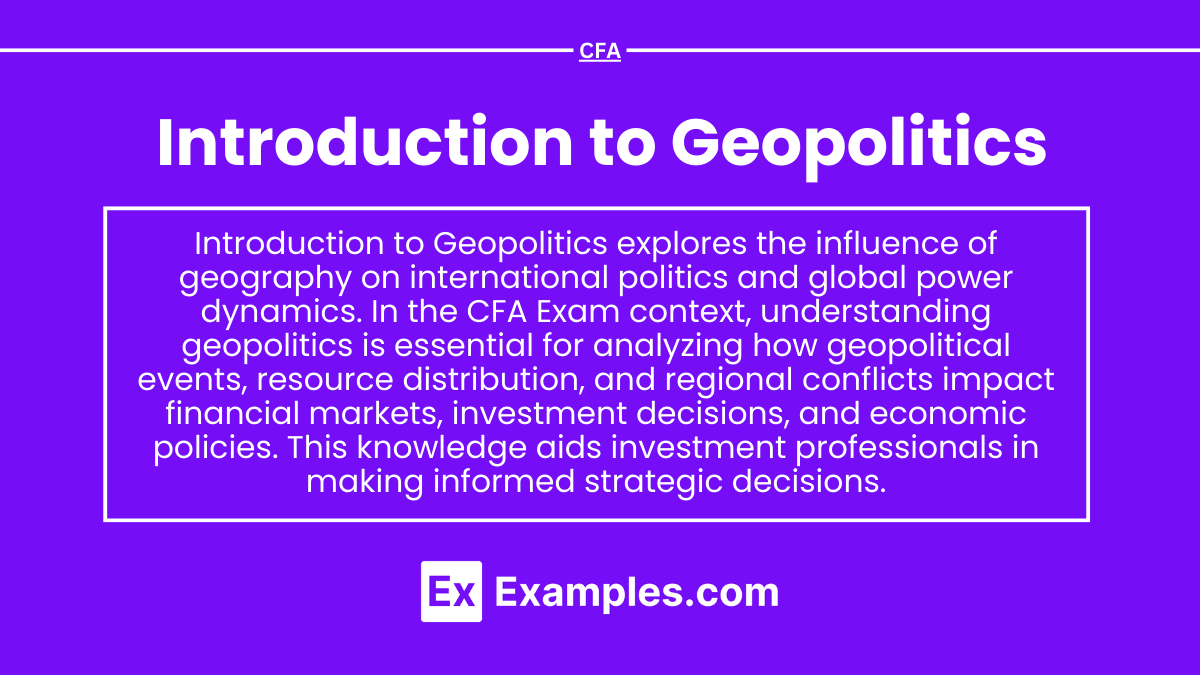Geopolitics provides a framework for understanding the influence of geographic and political factors on economic and investment landscapes. This topic explores how global political dynamics, regional conflicts, and international relations impact markets, trade, and capital flows. It delves into the strategic considerations of countries and the power structures that shape resource distribution and economic policies. Understanding these factors is essential for assessing geopolitical risks and opportunities in global investment strategies, aiding professionals in making informed decisions within an interconnected financial environment.
Learning Objectives
In studying “Introduction to Geopolitics” for the CFA, you should learn to understand the influence of geopolitical factors on global markets and economic stability. Analyze how political events, such as elections, trade policies, and diplomatic relations, impact asset prices, currency exchange rates, and investment strategies. Recognize the importance of regional conflicts, alliances, and power shifts in shaping economic landscapes. Evaluate risk management approaches to mitigate the effects of geopolitical uncertainties on portfolios. Additionally, develop an awareness of how geopolitical developments interact with macroeconomic indicators to inform investment decisions in a global context.
Understanding the Influence of Geopolitical Factors on Global Markets and Economic Stability
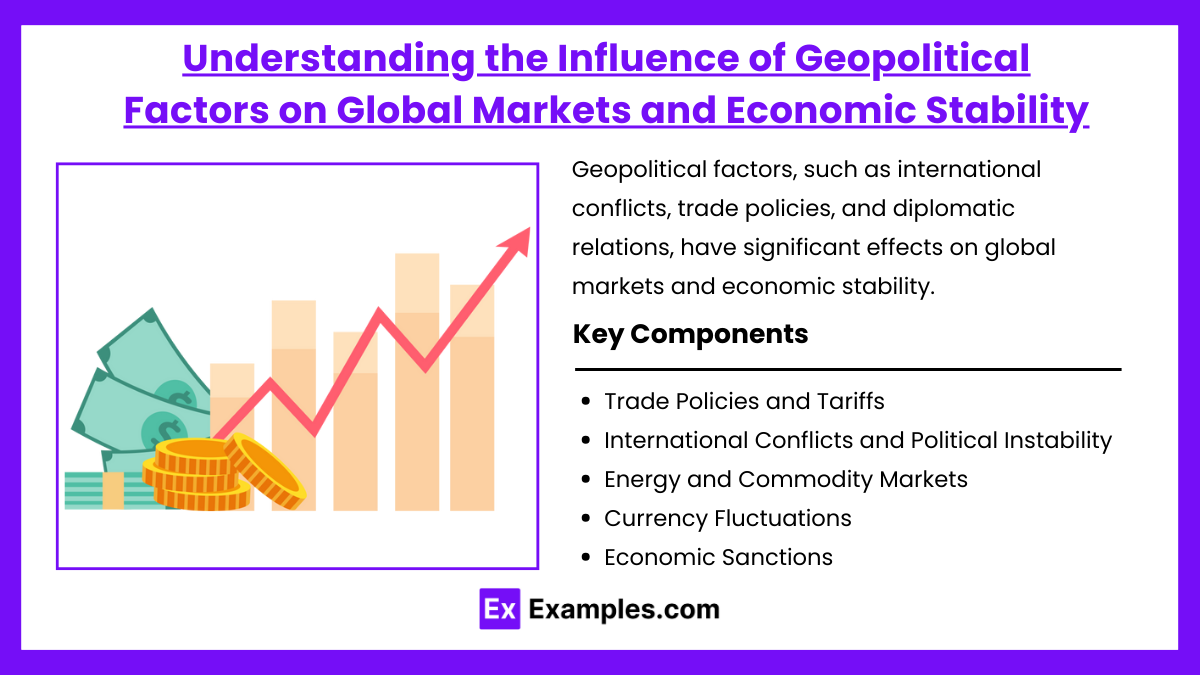
Geopolitical factors, such as international conflicts, trade policies, and diplomatic relations, have significant effects on global markets and economic stability. These factors influence investor confidence, commodity prices, currency values, and supply chains, making them important considerations for policymakers, businesses, and investors. Here’s a closer look at how geopolitical events shape global economic conditions and market behavior.
1. Trade Policies and Tariffs
Trade policies and tariffs impact the cost of goods and services traded between countries. When nations impose tariffs or restrictive trade policies, they can disrupt global supply chains and affect the profitability of companies dependent on international markets.
- Impact on Markets: Trade tensions increase market volatility, as investors react to changes in costs, demand, and profitability for affected industries.
- Effect on Economic Stability: Restrictive trade policies can slow economic growth by reducing export revenue, raising costs for consumers, and impacting employment in trade-dependent sectors.
2. International Conflicts and Political Instability
Conflicts between countries, such as military confrontations, territorial disputes, and political instability, introduce uncertainty into global markets, impacting commodities, investments, and currencies.
- Impact on Markets: Political instability can cause sharp declines in stock markets, particularly in the countries involved. Investors may also seek safe-haven assets, like gold or the U.S. dollar, to protect against potential losses.
- Effect on Economic Stability: Conflicts can disrupt supply chains, reduce trade, increase inflation, and lead to economic sanctions that limit business operations and trade opportunities.
3. Energy and Commodity Markets
Energy and commodity markets are particularly sensitive to geopolitical events, as many commodities, such as oil and natural gas, are sourced from politically unstable regions. Geopolitical disruptions in these areas can affect supply, leading to price volatility.
- Impact on Markets: Rising commodity prices increase costs for businesses and consumers, impacting stock markets and driving inflation.
- Effect on Economic Stability: Sustained high prices in key commodities, such as oil, can slow economic growth by increasing transportation and production costs, reducing consumer spending power.
4. Currency Fluctuations
Geopolitical events often lead to currency fluctuations, as investor confidence in a country’s stability impacts the value of its currency. Currency devaluation or appreciation affects trade balances, investment flows, and inflation.
- Impact on Markets: Currency instability increases costs for multinational companies, affecting profits and raising the price of imported goods.
- Effect on Economic Stability: Sudden currency swings can destabilize economies, particularly in emerging markets with high foreign debt, as repayment costs increase when the local currency weakens.
5. Economic Sanctions
Sanctions are a tool used by countries to penalize others for actions that threaten international stability or human rights. Sanctions limit economic activity by restricting trade, freezing assets, and banning exports/imports with targeted countries.
- Impact on Markets: Sanctions can depress the stock markets of affected countries and disrupt global supply chains, particularly for goods and commodities that are difficult to replace.
- Effect on Economic Stability: Countries targeted by sanctions may experience severe economic slowdowns, inflation, and reduced access to essential goods, which can impact their overall stability.
Impact of Political Events on Asset Prices, Currency Exchange Rates, and Investment Strategies
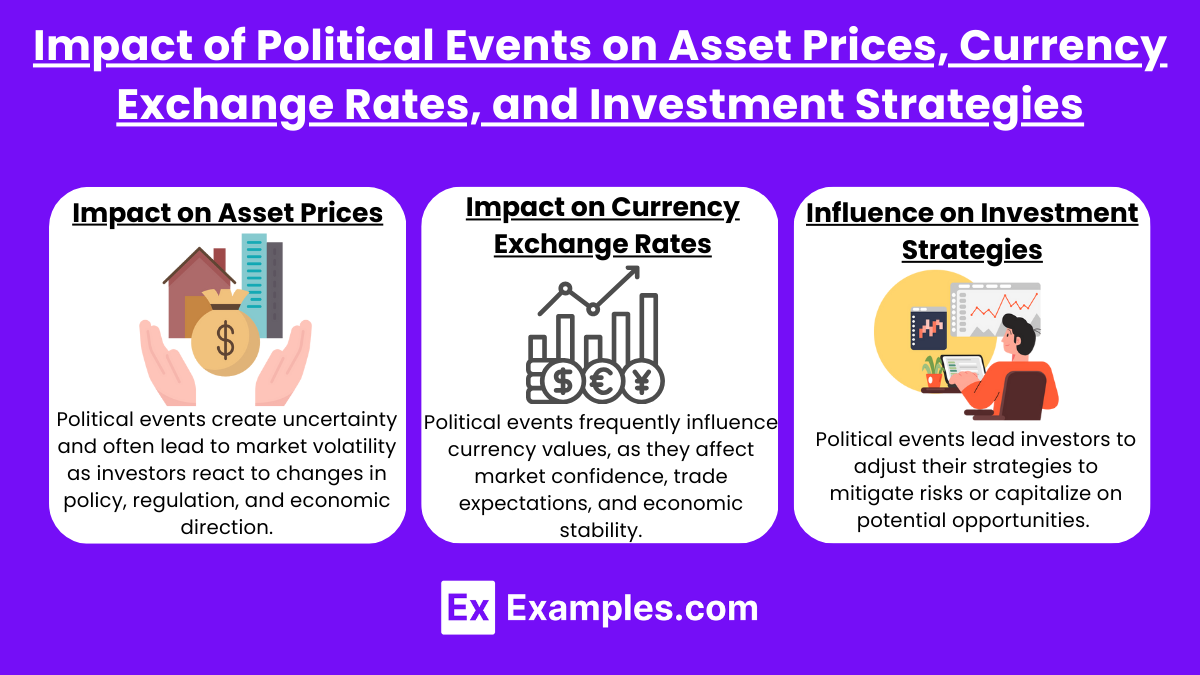
Political events, such as elections, regulatory changes, trade agreements, and geopolitical conflicts, have a profound effect on financial markets. These events can lead to fluctuations in asset prices, currency exchange rates, and influence the strategic decisions made by investors. Here’s a breakdown of how political events impact these aspects and how investors often adjust their strategies accordingly.
1. Impact on Asset Prices
Political events create uncertainty and often lead to market volatility as investors react to changes in policy, regulation, and economic direction.
- Elections: Elections bring the potential for changes in economic policy, affecting sectors differently. For instance, a government favoring renewable energy may boost renewable stocks, while a shift to more conservative policies might favor traditional energy sectors.
- Regulatory Changes: New regulations or deregulations can directly impact specific sectors. Stricter environmental laws, for example, may increase costs for certain industries, affecting stock prices.
- Geopolitical Conflicts: Conflicts can lead to declines in stock markets, especially in sectors like travel, tourism, and international trade, while defense sector stocks may benefit.
Example: In the U.S., presidential elections often lead to increased volatility, as investors adjust portfolios based on anticipated tax, regulatory, and spending policies that could affect various industries.
2. Impact on Currency Exchange Rates
Political events frequently influence currency values, as they affect market confidence, trade expectations, and economic stability. Changes in exchange rates have wide-ranging effects, impacting international trade, tourism, and foreign investment flows.
- Political Stability: Stable political environments tend to attract foreign investment, strengthening the currency. In contrast, political turmoil or unexpected poSignificance of Regional Conflicts, Alliances, and Power Shifts in Shaping Economic Landscapeslicy changes can cause currency depreciation as investors seek safer markets.
- Trade Policies and Tariffs: Political events affecting trade relationships, such as tariffs or trade agreements, impact currency demand. For example, tariffs may reduce demand for a country’s exports, weakening its currency.
- Interest Rate Expectations: Political changes can alter expectations about a country’s monetary policy. For instance, a government that is more fiscally conservative may lead to a stronger currency due to expected higher interest rates.
Example: Following the Brexit referendum in 2016, the British pound dropped significantly as investors anticipated economic uncertainty and trade disruption in the U.K. market, impacting global currency markets and investment flows.
3. Influence on Investment Strategies
Political events lead investors to adjust their strategies to mitigate risks or capitalize on potential opportunities. Political developments often prompt changes in asset allocation, sector focus, and risk management approaches.
- Safe-Haven Assets: In times of political uncertainty, investors may move funds into safe-haven assets such as gold, U.S. Treasury bonds, or stable currencies like the U.S. dollar or Swiss franc to preserve capital and avoid volatility.
Significance of Regional Conflicts, Alliances, and Power Shifts in Shaping Economic Landscapes
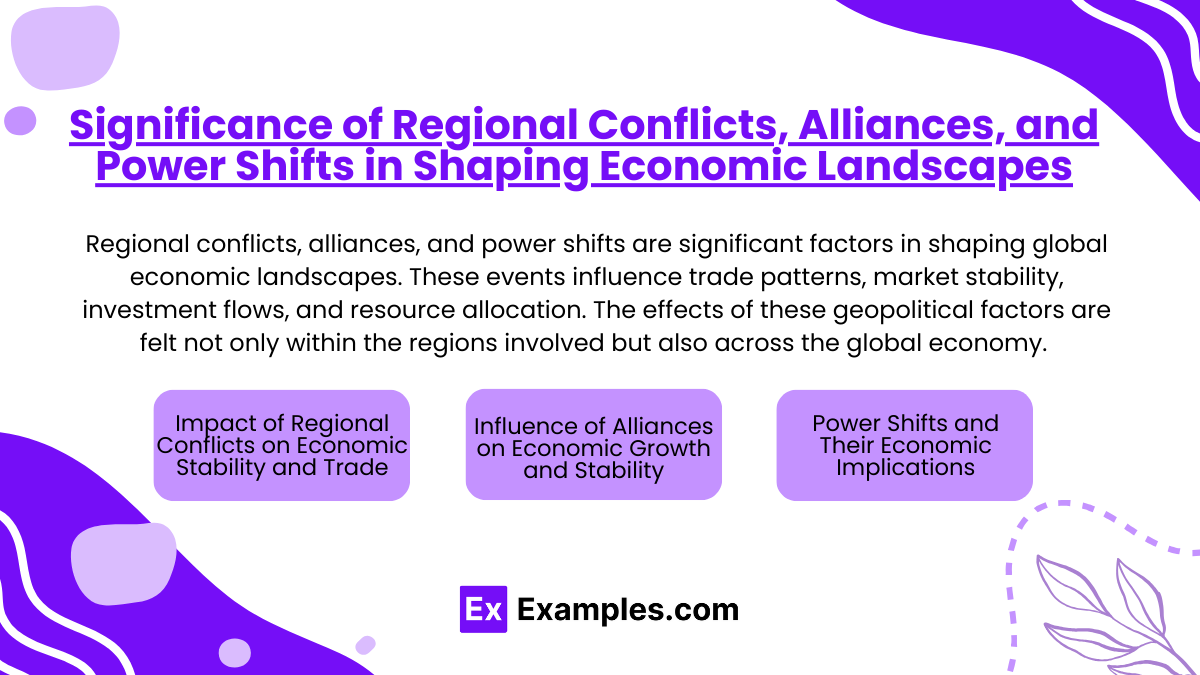
Regional conflicts, alliances, and power shifts are significant factors in shaping global economic landscapes. These events influence trade patterns, market stability, investment flows, and resource allocation. The effects of these geopolitical factors are felt not only within the regions involved but also across the global economy. Here’s an in-depth look at how these elements shape economic landscapes and the potential impacts on markets and international relations.
1. Impact of Regional Conflicts on Economic Stability and Trade
Regional conflicts disrupt economic stability and create uncertainty for businesses and investors. Conflicts can lead to destruction of infrastructure, reducFixed income, often represented by bonds, refers to investment securities that provide returns in the form of regular interest payments and principal repayment upon maturity. In the context of the CMT Exam, understanding fixed income is crucial for analyzing market trends, interest rate movements, and the overall impact on investment strategies and portfolio management.ed productivity, and decreased consumer and investor confidence, affecting both local and global economies.
- Supply Chain Disruptions: Conflicts in regions that are key to global supply chains can halt the flow of essential goods. For example, conflicts in areas with critical natural resources (like oil in the Middle East) can disrupt global supply, driving up costs and creating shortages.
- Market Volatility: Investors typically react to regional conflicts by reallocating assets, often moving to safe-haven investments such as gold or U.S. Treasury bonds, resulting in increased volatility in equity and currency markets.
- Humanitarian and Refugee Impact: Conflicts lead to forced migrations, which put economic pressure on neighboring regions. Hosting refugees increases social and financial strain, particularly in resource-limited countries, while the outflow from conflict zones affects the local workforce and consumer demand.
Example: The Russia-Ukraine conflict disrupted global wheat and energy markets, driving inflation and causing ripple effects across Europe and beyond, impacting industries reliant on these resources.
2. Influence of Alliances on Economic Growth and Stability
Alliances among nations, such as trade agreements and regional coalitions, foster economic growth and create a more predictable trading environment. Alliances reduce barriers to trade, promote investment, and enable collective economic security, fostering an environment conducive to growth.
- Trade Agreements: Regional trade agreements like the European Union (EU), United States-Mexico-Canada Agreement (USMCA), and Association of Southeast Asian Nations (ASEAN) reduce tariffs and regulatory barriers, boosting trade and investment flows among member nations. These alliances create large, integrated markets that attract global investors.
- Economic and Financial Aid: Alliances can involve economic support or development funds, which help stabilize and grow weaker economies. This aid builds stronger trade relationships and prevents economic instability that could lead to broader regional conflicts.
- Shared Infrastructure Projects: Alliances often lead to shared investments in infrastructure, such as transportation, energy, and digital networks, which increase efficiency and lower costs for businesses operating in the region.
Example: The European Union has enabled seamless trade and economic stability within its member states, while creating a single market that enhances competitive advantages and attracts foreign direct investment.
3. Power Shifts and Their Economic Implications
Power shifts, whether through political elections, changes in dominant industries, or shifts in global influence, significantly impact economic landscapes. As nations rise or decline in influence, they alter trade dynamics, currency stability, and investment flows.
- Economic Nationalism: Power shifts toward more protectionist governments can lead to policies that limit foreign trade, disrupt existing alliances, and alter global trade balances. This can increase tariffs, leading to retaliatory measures from other nations and reducing overall trade efficiency.
- Shifts in Global Influence: As countries like China expand their economic influence, they reshape trade patterns and create new economic partnerships, especially in emerging markets. China’s Belt and Road Initiative, for instance, has shifted investment toward developing countries, building infrastructure and creating stronger economic ties.
- Resource Control and Influence: Power shifts can lead to changes in control over key resources, such as oil or rare minerals. Countries with significant resources gain economic leverage, impacting global supply chains, prices, and trade dependencies.
Example: China’s growing influence in Africa and Latin America through infrastructure projects and investments has strengthened its trade relationships and access to resources, reshaping regional economic dynamics and global supply chains.
Evaluating Risk Management Approaches to Mitigate Geopolitical Uncertainties
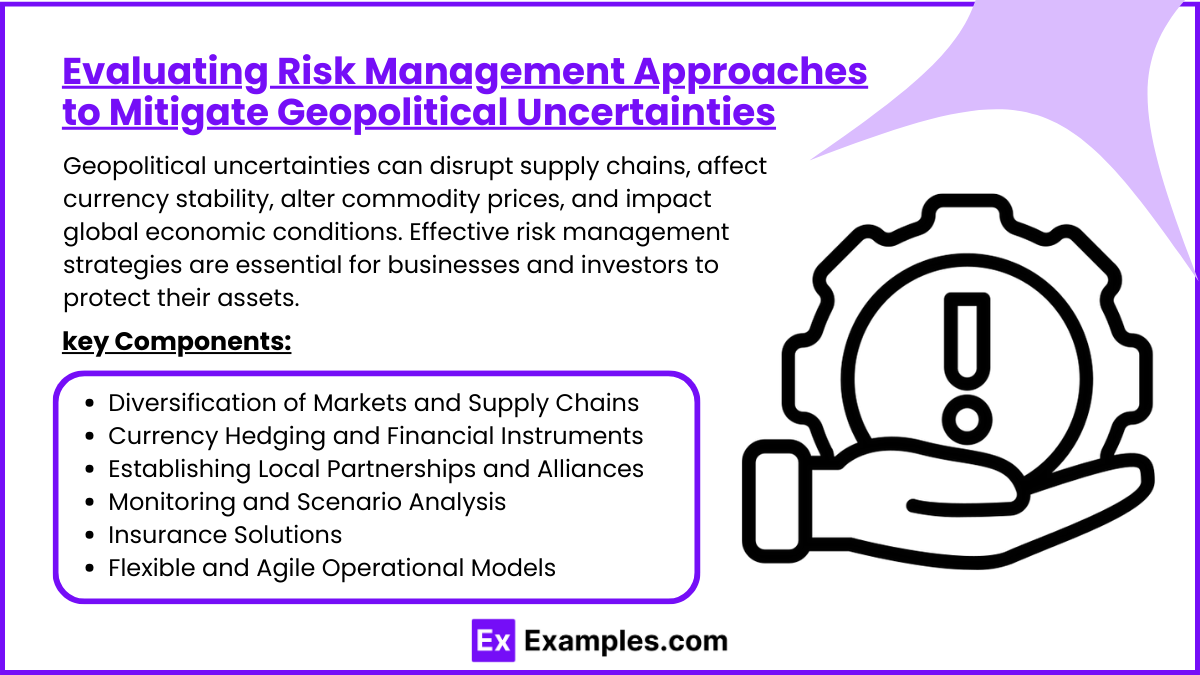
Geopolitical uncertainties can disrupt supply chains, affect currency stability, alter commodity prices, and impact global economic conditions. Effective risk management strategies are essential for businesses and investors to protect their assets and maintain resilience amid these uncertainties. Here’s a look at key risk management approaches that help mitigate the effects of geopolitical risks.
1. Diversification of Markets and Supply Chains
One of the most effective ways to manage geopolitical risk is by diversifying markets and supply chains. Diversification minimizes dependence on any single region, reducing exposure to localized risks.
- Market Diversification: Expanding into multiple geographic regions spreads risk across different economies, reducing vulnerability to economic or political turmoil in one area.
- Supply Chain Diversification: Sourcing materials from multiple countries helps avoid production halts if one country’s supply is disrupted due to conflict, tariffs, or political instability.
2. Currency Hedging and Financial Instruments
Currency volatility due to geopolitical uncertainty can affect profitability, especially for companies operating internationally. Currency hedging helps manage this risk by stabilizing cash flows and protecting against unfavorable exchange rate movements.
- Forward Contracts: Locking in exchange rates for future transactions helps protect companies from currency fluctuations.
- Options and Futures: Using currency options or futures allows companies to manage exchange rate risk while benefiting from favorable rate changes.
- Commodity Hedging: Hedging against fluctuations in commodity prices, such as oil or metals, helps companies mitigate the risk of rising costs due to geopolitical events.
3. Establishing Local Partnerships and Alliances
Building partnerships with local businesses, governments, or organizations in key regions can create a support network that helps mitigate risk when operating in unfamiliar or unstable regions.
- Joint Ventures and Partnerships: Collaborating with local entities provides valuable insights, enhances political goodwill, and can protect against regulatory or political changes.
- Government Relations: Strong relationships with local governments can help businesses navigate regulatory changes, trade disputes, and compliance requirements.
4. Monitoring and Scenario Analysis
Actively monitoring geopolitical developments and conducting scenario analysis allows businesses to anticipate risks and prepare accordingly. Scenario analysis involves assessing potential future events and their impacts, enabling organizations to develop proactive strategies.
- Geopolitical Risk Monitoring: Regularly tracking political events, regulatory changes, and social movements enables timely responses to potential disruptions.
- Scenario Planning: Developing scenarios for potential geopolitical events, such as trade disputes, sanctions, or military conflicts, allows companies to create response plans and allocate resources accordingly.
5. Insurance Solutions
Geopolitical insurance provides coverage against risks such as political violence, expropriation, and supply chain disruptions. This approach helps companies manage financial risks associated with operating in high-risk regions.
- Political Risk Insurance: Covers losses due to expropriation, nationalization, or other government actions that could affect assets or operations.
- Trade Credit Insurance: Protects companies from losses if foreign customers default on payments due to economic or political instability.
- Supply Chain Disruption Insurance: Covers losses incurred from disruptions in the supply chain due to political events, natural disasters, or other unforeseen circumstances.
6. Flexible and Agile Operational Models
Adopting flexible operational models allows companies to adapt quickly to changing political environments. Agile business practices, such as lean inventory management, decentralized production, and digitalized workflows, help businesses remain responsive.
- Decentralized Operations: Establishing production or distribution centers in multiple regions reduces dependency on a single location and allows operations to continue if one area is disrupted.
- Lean Inventory Management: Managing inventory based on real-time demand reduces exposure to supply chain delays caused by political events.
- Remote Work and Digital Solutions: Digitalizing operations allows companies to maintain productivity even if employees are unable to work in certain locations due to geopolitical disruptions.
Examples
ExampEvaluating Risk Management Approaches to Mitigate Geopolitical Uncertaintiesle 1: Territorial Disputes
Geopolitics often involves analyzing territorial disputes between countries, such as the ongoing tensions in the South China Sea. Multiple nations claim parts of this strategically important region due to its rich natural resources and vital shipping routes. Understanding the historical, cultural, and legal aspects of these claims is crucial in geopolitics, as it affects international relations and security dynamics.
Example 2: Global Power Shifts
The rise of emerging economies, particularly in Asia, has significant implications for global geopolitics. For example, China’s growing economic and military power challenges the traditional dominance of Western nations, particularly the United States. This shift alters alliances, trade relationships, and security arrangements, necessitating an examination of how power dynamics influence global stability and conflict.
Example 3: Resource Distribution
Geopolitics examines how the distribution of natural resources, such as oil and water, affects international relations. For instance, countries in the Middle East have significant oil reserves, making them key players in global energy markets. The competition for these resources can lead to political alliances, conflicts, and economic strategies, highlighting the interplay between geography and resource management.
Example 4: Climate Change and Migration
Climate change poses significant geopolitical challenges, leading to discussions about environmental policy and migration patterns. As certain regions become increasingly uninhabitable due to rising sea levels, extreme weather, or resource scarcity, populations may migrate to more stable areas. This movement can create tensions between host countries and migrants, affecting national security and international cooperation.
Example 5: Geostrategic Alliances
Countries often form alliances based on geographic and strategic interests, which can shape global politics. An example is NATO, a military alliance formed for collective defense against potential threats. The dynamics of such alliances are influenced by geopolitical considerations, including geographic proximity, historical relationships, and the perceived threat from rival nations. Understanding these alliances is crucial for analyzing international relations and conflict resolution.
Practice Questions
Question 1
What is a key factor that influences geopolitical relations between countries?
A) Cultural festivals
B) Natural resources
C) Fashion trends
D) Social media usage
Correct Answer: B) Natural resources.
Explanation: Natural resources play a significant role in geopolitics as they can determine the wealth and power of nations. Countries rich in resources like oil, gas, minerals, and water often have greater geopolitical influence and can form strategic alliances based on resource distribution and management. Access to and control of these resources can lead to conflicts or collaborations, making them a critical factor in international relations. Options A, C, and D are less impactful on the geopolitical landscape compared to the significance of natural resources.
Question 2
How does the concept of geostrategy relate to geopolitics?
A) It focuses solely on economic development.
B) It refers to the use of geographic factors in foreign policy planning.
C) It is unrelated to international relations.
D) It primarily concerns cultural exchanges between nations.
Correct Answer: B) It refers to the use of geographic factors in foreign policy planning.
Explanation: Geostrategy is a subset of geopolitics that emphasizes the strategic importance of geographic factors in shaping foreign policy decisions. This includes considerations like geographic location, access to waterways, and regional stability when nations formulate their diplomatic and military strategies. Understanding geostrategy is essential for analyzing how countries position themselves in relation to one another in the global arena. Options A, C, and D do not accurately represent the relationship between geostrategy and geopolitics.
Question 3
What role does climate change play in contemporary geopolitics?
A) It only affects local economies.
B) It has no impact on international relations.
C) It can exacerbate resource scarcity and lead to migration.
D) It solely influences environmental policies.
Correct Answer: C) It can exacerbate resource scarcity and lead to migration.
Explanation: Climate change significantly impacts geopolitics by exacerbating resource scarcity, particularly water and arable land, leading to potential conflicts and migration pressures. As certain regions become less hospitable due to extreme weather events, rising sea levels, or diminished resources, populations may migrate, creating tensions in neighboring areas. This can lead to diplomatic challenges, humanitarian crises, and shifts in geopolitical alliances, highlighting the interconnectedness of environmental issues and international relations. Options A, B, and D underestimate the broad implications of climate change on global stability and policy.

